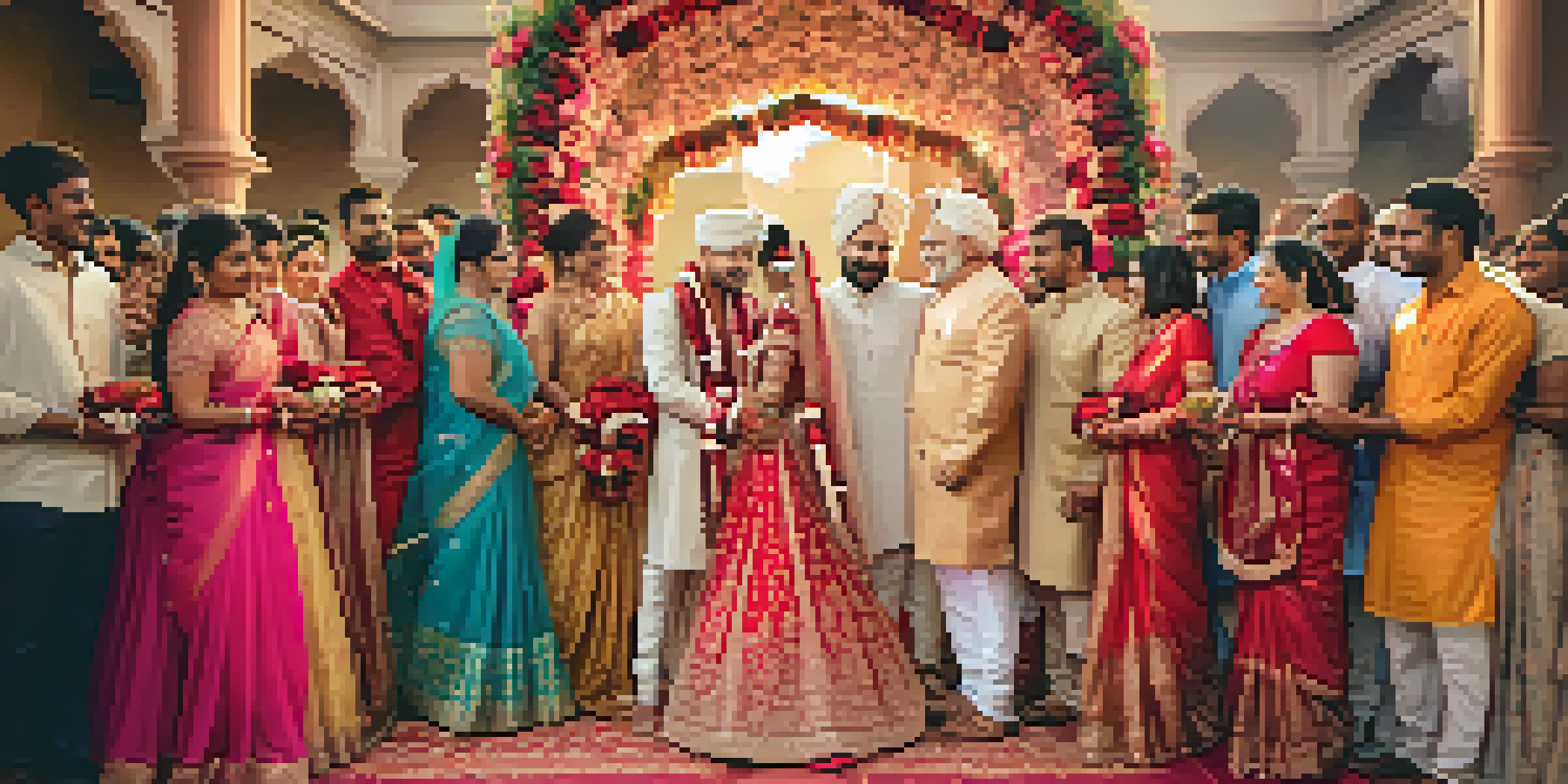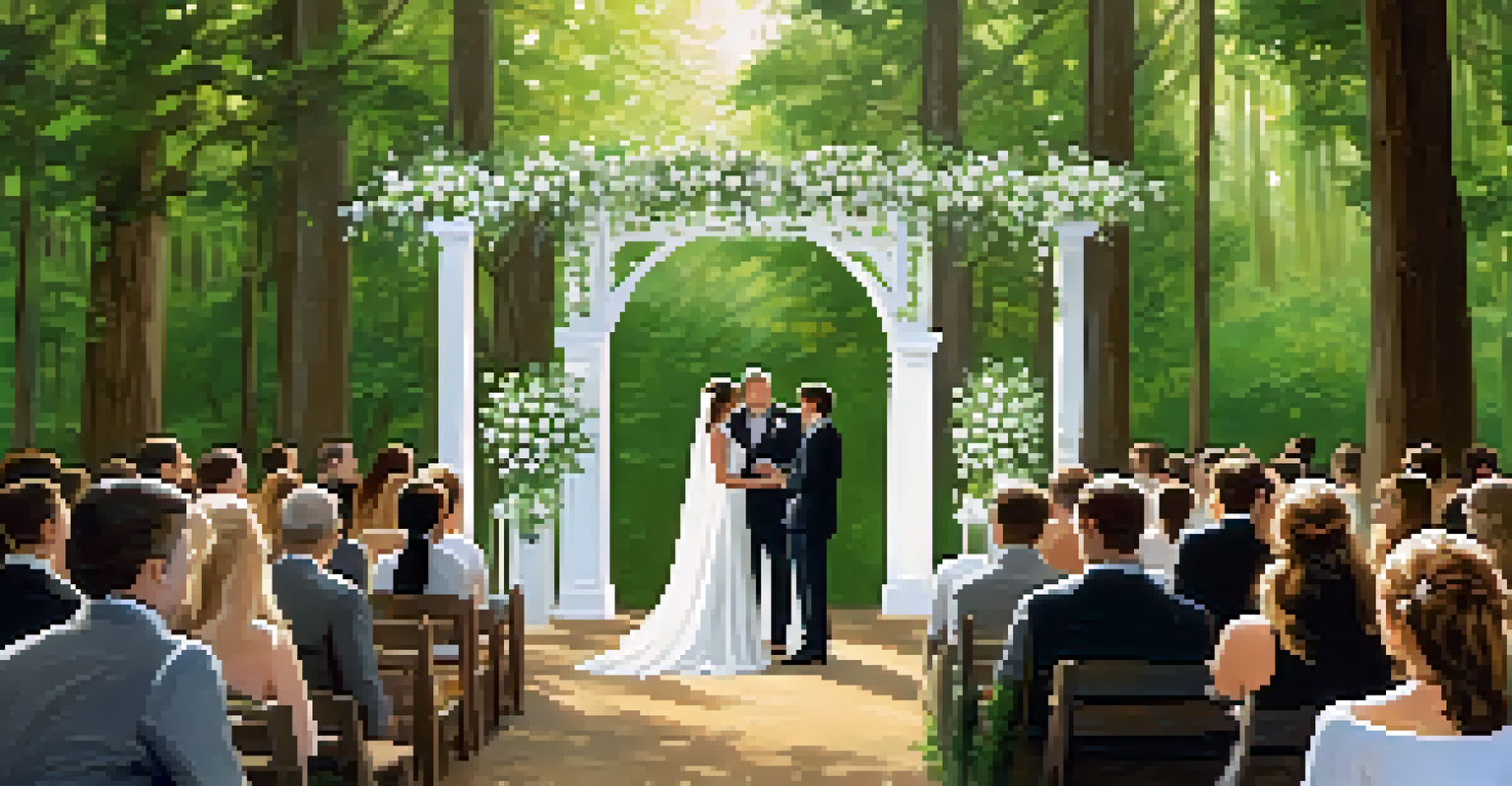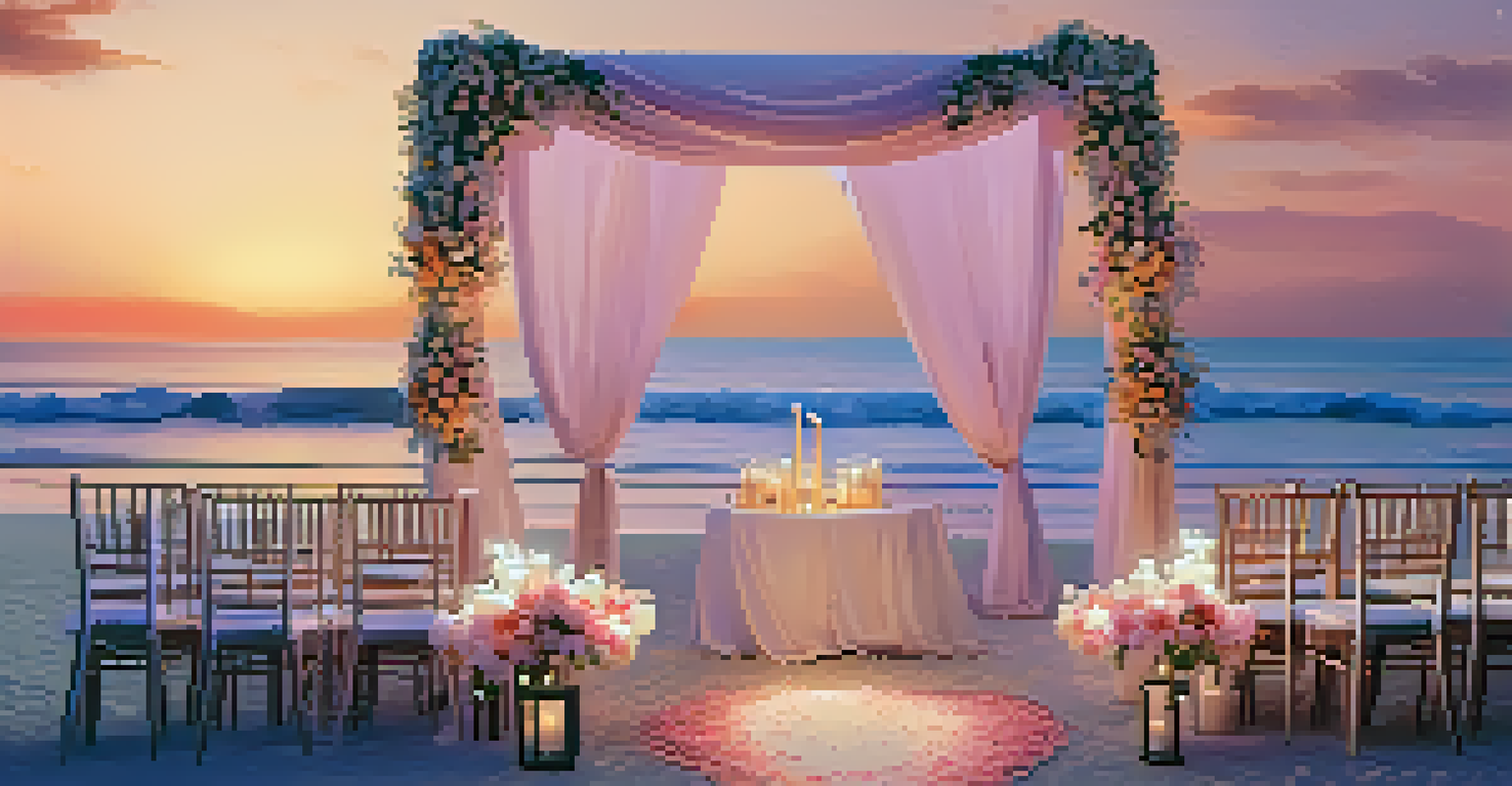Marriage Rituals: Binding Souls and Cultures in Spirituality

Understanding the Essence of Marriage Rituals
Marriage rituals serve as a bridge connecting individuals to their cultural and spiritual roots. They not only signify the union of two people but also the joining of families and communities. These rituals often reflect deep-seated beliefs about love, commitment, and the sacred nature of partnership.
Marriage is not just about two individuals; it is a collective experience that involves families and communities.
In many cultures, marriage is viewed as a spiritual journey, where the couple embarks on a shared path of growth and support. The rituals involved can vary widely, from elaborate ceremonies to simple blessings. Regardless of their form, these practices embody the hopes and dreams of those entering this life-changing commitment.
Ultimately, marriage rituals remind us of the beauty of human connection, celebrating love in its many forms. They highlight the significance of community in nurturing relationships, reflecting the idea that marriage is not just about two individuals but a collective experience.
Traditional Marriage Rituals Around the World
Across the globe, marriage rituals take on unique characteristics that reflect the values of different societies. For instance, in India, the colorful and vibrant Hindu wedding ceremonies often last several days, filled with rituals that symbolize purity, prosperity, and love. Similarly, in a traditional Chinese wedding, the couple may partake in tea ceremonies, honoring family ties and respect for ancestors.

In contrast, Scandinavian countries often celebrate 'handfasting,' a ritual where couples literally tie their hands together, symbolizing their commitment. This practice dates back to ancient times and emphasizes the idea of unity. Each of these rituals showcases the rich tapestry of cultural beliefs that shape how love and commitment are expressed.
Marriage Rituals Reflect Culture
Marriage rituals around the world embody the cultural values and beliefs of different societies, highlighting the diverse ways love and commitment are expressed.
These diverse practices serve as a reminder of the profound ways in which love is celebrated worldwide. While the rituals may differ, the underlying sentiment remains the same: a commitment to partnership and a shared future.
Spiritual Significance in Marriage Rituals
Marriage rituals often carry deep spiritual significance, transcending the physical act of getting married. Many cultures believe that these ceremonies invoke divine blessings, ensuring a prosperous and harmonious union. For example, in some Native American traditions, couples may incorporate elements of nature, like tying a knot with a piece of sage, to symbolize their bond with the earth and each other.
Love knows no boundaries, and marriage is the celebration of that love in all its diverse forms.
The spiritual aspect of marriage can also be seen in the practice of exchanging vows, which often reflects the couple's intentions and promises to one another. These vows serve as a spiritual contract, reinforcing the idea of commitment not just to each other, but to a higher purpose. They invite blessings from the universe, fostering a sense of connection to something greater.
By incorporating spirituality into marriage rituals, couples can deepen their bond and create a foundation rooted in shared values and beliefs. This spiritual layer adds richness to the celebration, making it a transformative experience for the couple and their loved ones.
Modern Adaptations of Traditional Marriage Rituals
As society evolves, so do marriage rituals, with many couples opting for modern adaptations that reflect their personal beliefs and lifestyles. For instance, while traditional weddings may focus on religious or cultural expectations, many modern couples choose to blend these elements with personalized touches. This could include writing their own vows or incorporating non-traditional symbols into their ceremonies.
The rise of destination weddings is another example of how modern couples are reshaping rituals. Many choose to exchange vows in picturesque locations, often incorporating local customs and practices into their ceremonies. This creates a unique blend of tradition and personal meaning, allowing couples to express their love story in a setting that resonates with them.
Community Enhances Marriage Bonds
The involvement of family and friends in marriage rituals emphasizes the collective nature of the commitment, providing support and fostering a sense of belonging.
These adaptations highlight the importance of personal choice in marriage rituals, allowing couples to craft ceremonies that are meaningful and reflective of their journey together. They pave the way for new traditions that honor the past while embracing the future.
The Role of Community in Marriage Rituals
Community plays a vital role in marriage rituals, serving as a support system for couples as they embark on their new journey. In many cultures, family and friends participate actively in the ceremonies, helping to create an atmosphere of love and joy. These communal elements emphasize the idea that marriage is not just an individual commitment, but a collective celebration.
In some African traditions, for instance, the entire village may come together to celebrate a wedding, reinforcing social bonds and shared values. This sense of community support can provide a strong foundation for the couple, reminding them that they are not alone in their journey. It highlights the importance of relationships and interconnectedness in a successful marriage.
By involving the community in marriage rituals, couples can foster a sense of belonging and shared purpose. This collective participation can strengthen relationships and create lasting memories that enrich the couple's new life together.
The Impact of Cultural Exchange on Marriage Rituals
Cultural exchange has a profound impact on marriage rituals, as globalization allows for the sharing of traditions across borders. Couples today may incorporate elements from various cultures into their ceremonies, creating a unique blend that reflects their diverse backgrounds. This not only enriches the wedding experience but also fosters understanding and appreciation for different cultures.
For example, a couple with Indian and Western backgrounds might choose to include a traditional Hindu ceremony alongside a Western-style reception. This fusion of practices creates a rich tapestry of experiences, allowing them to honor both sides of their heritage. Such practices showcase how love transcends cultural boundaries, creating a shared narrative that is uniquely theirs.
Modern Weddings Embrace Diversity
Today's couples are blending traditional and contemporary practices in their wedding ceremonies, creating unique celebrations that honor their personal stories and cultural backgrounds.
Ultimately, cultural exchange in marriage rituals highlights the beauty of diversity and the power of love to unite people from different backgrounds. It encourages couples to explore their roots while embracing new traditions, resulting in ceremonies that are both meaningful and memorable.
The Future of Marriage Rituals in a Changing World
As we move into the future, marriage rituals are likely to continue evolving in response to societal changes and individual preferences. With the growing acceptance of diverse relationships, we may see even more varied expressions of love reflected in marriage ceremonies. This may include non-traditional partnerships, unique venues, or even virtual weddings that adapt to modern lifestyles.
Additionally, sustainability is becoming an increasingly important factor in wedding planning. Couples are now more conscious of their environmental impact, leading to eco-friendly rituals that prioritize sustainability. For instance, they might choose to use biodegradable decorations or host their ceremonies in natural settings, blending their love for nature with their commitment to each other.

The future of marriage rituals appears bright, as couples continue to innovate while honoring their traditions. This ongoing evolution reflects the dynamic nature of love and commitment, ensuring that marriage remains a meaningful and cherished experience for generations to come.